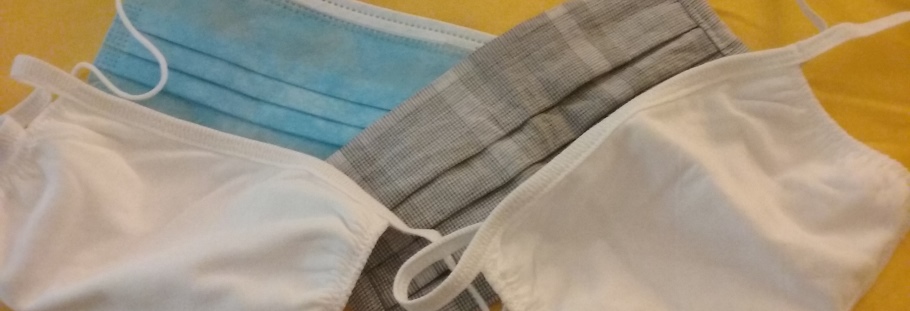As Mask Ordinances Proliferate, So Do Mask Myths
United Church of Christ – Wider Church Ministries
Humanitarian Development Team
Coronavirus (COVID-19) Daily Briefing
Barbara T. Baylor, MPH – Temporary Health Liaison
Face Mask Ordinances Soar – And So Do Myths About Them!
According to NPR News, more than 20 states have now issued orders requiring people to wear face masks in public as the numbers of new COVID-19 infections surge to record heights in parts of the United States.
Confirmed cases now number more than three million. But face mask use by the general public for limiting the spread of the COVID-19 pandemic is controversial, despite the fact that, as of April 3, 2020, the U.S. Centers for Disease Control and Prevention (CDC) recommend the public wear cloth masks. Some health experts believe that trust in face masks was hampered by earlier mixed messages on wearing face masks. Two research studies have emerged that are shining light on the usefulness of wearing masks.
A model from the University of Washington’s Institute for Health Metrics and Evaluation (IHME), a group that advises the White House, shows that if more people cover their faces to prevent spreading the coronavirus, between 17,742 and 28,030 deaths could be prevented across the United States between now and October 1.
Another projection developed by researchers at Arizona State University (ASU) in April showed that 24 to 65 percent of projected deaths could be prevented in Washington state in April and May if 80 percent of people wore cloth or homemade masks in public.
Both ASU and IHME’s models agree that the proportion of deaths that face masks could prevent differs from location to location and during different stages of the pandemic because transmission rates in the community at the time of projection affect outcomes.
The community-wide benefits of mask-wearing are likely to be greatest when face masks are used in conjunction with other practices such as social-distancing, and when adoption is nearly universal and compliance is high.
Why are so many of us reluctant to wear face masks? Infectious diseases physician Dr. Catharine Paules with Penn State Health Milton S. Hershey Medical Center, and pediatric allergist and immunologist Dr. Tracy Fausnight with Penn State Children’s Hospital share some common mask myths:
Myth: We didn’t need masks early in the pandemic, so we don’t need them now.
Fact: Very little data existed prior to COVID-19 to assess whether masks were useful to prevent community transmission of respiratory viruses. This, combined with the relatively low number of COVID-19 cases early on and concerns about potential global mask shortages, stopped U.S. health officials from recommending masks.
It is now clear that asymptomatic people can transmit COVID-19 through speaking, coughing or sneezing. These individuals are highly likely to spread COVID-19 to others because they feel well and may not be limiting their actions in the community. This led to public health officials strongly recommending masks to prevent COVID-19 spread from individuals who do not know they are infected.
Myth: No studies exist about the effectiveness of masks.
Fact: “Several observational studies published since the COVID-19 pandemic began show emerging data that masks coupled with other distancing measures help to prevent the transmission of COVID-19,” Paules said.
Myth: Wearing a mask prevents oxygen from getting into the lungs.
Fact: Surgical masks and cloth face coverings allow air to flow in and out of the lungs. They will not cause hypoxia (oxygen deprivation).
Myth: Masks trap in bacteria and fungus and make people more susceptible to bacterial or fungal pneumonia.
Fact: There is no data to support this statement. Healthcare providers ask patients at high risk for fungal infections, such as oncology patients, to wear masks for protection.
Myth: Masks won’t keep me from getting sick.
Fact: Masks do help keep you from getting sick, but they are even more effective at preventing somebody else from getting sick. They inhibit some of an infected person’s droplets from spreading. But masks alone are not a guarantee that you won’t get sick. Social distancing and hand hygiene also play crucial roles in preventing the spread of COVID-19.
Myth: Masks weaken the immune system.
Fact: The immune system is exposed to germs all the time. Wearing a mask doesn’t prevent it from “remembering” all those prior exposures and staying strong.
Myth: We don’t need masks. We need herd immunity.
Fact: Herd immunity works only if about 70 percent of the total population has COVID-19 antibodies from either a past infection or from a vaccine. Getting to that 70 percent comes at a substantial cost: a catastrophic number of deaths due to COVID-19.
One “myth” that has some truth – wearing a mask can cause some people anxiety and a sense of claustrophobia. But that can be conquered. “Try wearing a mask at home for short periods of time,” Paules said. “Then you can gradually build up to wearing it for a whole trip to the grocery store.”
COVID-19 Daily Briefing Archives
See Also: Racial and Ethnic Disparities – Information for Action Archive
Related News
Planning for Earth Month: Resources for Congregations
April is Earth Month, and for congregations, it can be a great time to further discern how...
Read MoreBodily Autonomy Means Every-BODY
Advocacy and Action for Women's and Gender Justice Local events stir thoughts and...
Read MoreAn ally experiences PRIDE in the CLE
Advocacy and Action for Women's and Gender Justice Local events stir thoughts and...
Read More


